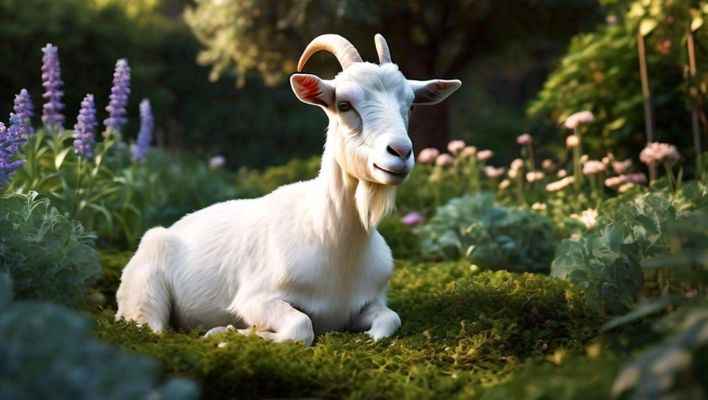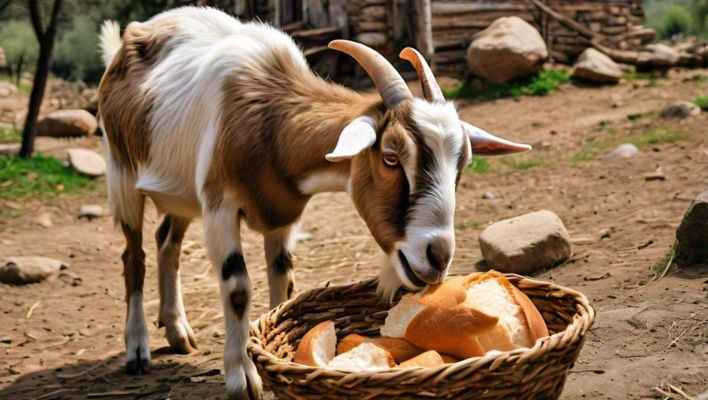Can goats eat cabbage? Benefits, Risks & Learn Feeding Tips!
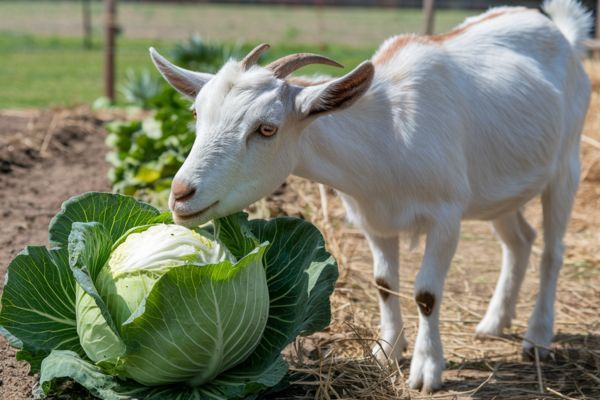
Cabbage contains many vitamins and minerals, making it a popular addition to goat diets. But despite being full of benefits, many goat owners often ask this question” Can goats eat cabbage?”
Goats can eat cabbage, but if they eat small amounts of cabbage, it is the best food for their health. Cabbage contains various vitamins, fiber (which helps keep the digestive system working well), protein, folate elements, and potassium.
Vitamins K, C, and B6 are found in cabbage. Cabbage contains a lot of water, which can sometimes make goats feel bloated or uncomfortable in their stomachs, like when we drink too much water too quickly.
Research from the International Journal of Veterinary Sciences and Animal Husbandry shows that cabbage and other plants with goitrogens can stop goats from using iodine properly, increasing the risk of iodine deficiency.
A shortage of this can make the thyroid gland swell, known as goitre, and cause other health issues.
Without iodine, a goat’s thyroid won’t function, just like a car won’t run without gas.
Just as your goats can eat small amounts of cabbage, you can also feed small amounts of cabbage to your sheep, but always keep the amount low to avoid digestive and other health problems.
Goats can suffer from serious health problems due to eating certain poisonous vegetables such as potatoes, tomatoes, and rhubarb.
Goats enjoy eating cabbage leaves, but just like cabbage heads, they should only eat a small amount to avoid stomach issues.
Similarly, sheep can eat cabbage leaves, but consuming large amounts of cabbage leaves can affect the digestive system of sheep.
In addition to cabbage heads, goats can enjoy eating cabbage stems, leaves, and plants.

So, before feeding the plants, make sure that the plants have not been sprayed with any kind of insecticide and always feed the plants in small quantities to your goats because eating too many plants can cause digestive problems.
Avoid feeding goats certain vegetables such as onions, garlic, and avocado, as these vegetables are considered toxic to goats. Add cabbage to their diet little by little, along with hay and a mix of other vegetables.
Cabbage can be of great benefit to goats when the winter months begin because it provides a source of fresh vegetables when other plants are unavailable to goats.
While cabbage is a beneficial food for goats, it is also important to remember that cabbage is not the only food for goats. Leaves of many trees and vegetables are part of the goat’s diet.
Sheep also need different kinds of food, and cabbage should only be given sometimes, not as a daily meal. If you give your goats lettuce, make sure it’s fresh and don’t give too much, as it might cause bloating or diarrhea.
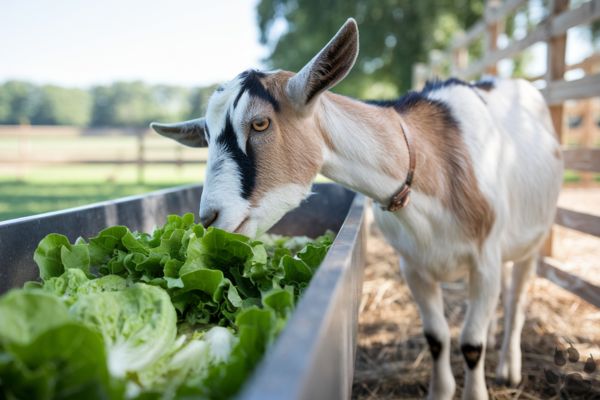
When the winter season begins, all-natural sources of water may freeze. Feeding the goat cabbage on this occasion helps to maintain its hydration level as cabbage is high in water content.
If you have cabbage in your garden and you have goats, your goats can enjoy eating the outer leaves of the cabbage. So, keep a close eye on how much cabbage or its outer leaves are eaten by goats to prevent stomach problems.
If you keep goats, you should give them small amounts of leafy greens, such as kale, to avoid possible problems like kidney damage.
In addition to the goat’s necessary forage., you can occasionally give lettuce to the goats. Cabbage can provide important nutrients for goats in winter, helping them stay healthy during harsh weather.
You can feed your goat cabbage leaves but also don’t neglect its essential food such as grass. If you are growing cabbage plants in your garden, allow your goats to eat small amounts of them occasionally, but be careful not to overdo it.
Cabbage is in the Brassica family, along with broccoli, Brussels sprouts, and kale.
Broccoli also contains nutrients similar to cabbage and can be safely eaten by goats. Goats enjoy eating lettuce because of its crunch, even though it’s not as nutritious as cabbage.
All the vegetables mentioned above are rich in vitamin C (which helps boost the immune system) and antioxidants so they are very healthy vegetables for both humans and goats.

However, some vegetables that belong to the nightshade family can be poisonous to goats and should be avoided. These vegetables include eggplant and black pepper.
Do goats find cabbage enjoyable to eat?
A goat is such an animal that if any kind of vegetable is placed in front of it, it will eat it. So, it is very hard to believe that cabbage would be offered to him and he would not eat it.
The basic diet of goats includes grass and leaves. But you can serve cabbage as a side dish to make the goat food tasty. Goats can get bored eating the same thing every day. So, if you provide something new, they will enjoy eating it.
If you give your goat too much cabbage, it can lead to health problems, so it’s important to keep the amount limited.
In addition to vegetables like cabbage, you might wonder about other treats. For example, can goats eat bread? Learn more about feeding bread to goats in our detailed article.
Health Benefits Of Eating Cabbage For Goats:

Here are some important health benefits of feeding cabbage to goats:
- Nutrient-Rich: Cabbage contains many nutrients such as vitamin C and fiber (which helps keep the digestive system working well), these nutrients are very beneficial for goat health.
- Digestive Health: Due to the fiber found in cabbage, goats maintain proper digestion, and goats can get rid of problems like bloating and constipation.
- Immune Support: The vitamin C found in cabbage is very effective for the immune system of goats, giving goats more power to fight infections and diseases.
- Healthy Weight Management: Cabbage is high in fiber (which helps keep the digestive system working well) but low in calories. High fiber helps goats maintain weight.
- Antioxidant Properties: A goat’s body contains many harmful free radicals and the antioxidants found in cabbage help to neutralize these radicals. This greatly reduces the risk of cellular damage and oxidative stress in goats.
- Anti-inflammatory Effects: Goats sometimes suffer from inflammatory problems, so the compounds found in cabbage can help with this problem. Apart from this, these compounds also have the power to solve problems like joint pain in goats.
- Improved Coat and Skin Health: The nutrients found in cabbage reduce skin diseases in goats and promote a shiny coat in goats.
- Hydration: Often goats can become dehydrated due to lack of water but cabbage has high water content which can solve this problem in goats especially during the hot season or during lactation. Just like how watermelons keep us hydrated in the summer, cabbage can help goats stay cool and hydrated.
- Natural Dewormer: Some studies have suggested that feeding cabbage to goats may have mild insecticidal effects in goats which naturally help to control internal organisms.
- Environmental Enrichment: If you offer cabbage to your goat as a treat, it can provide mental stimulation and enrichment in the goats. These things can reduce boredom in goats.
For more information on what other vegetable goats can safely eat, including cucumbers, check out our detailed article Can Goats Eat Cucumbers?
You may include a little broccoli in a goat’s diet along with cabbage for variety. Like cabbage, broccoli also contains many health benefits like vitamin C and vitamin K.
Its crunchiness makes it enjoyable for goats. However, similar to cabbage, it’s best to give it in small quantities to avoid digestion issues.

Risks associated with feeding cabbage to goats
Goitrogens
Like some other vegetables, cabbage is part of the Brassica family and contains goitrogens.
Goitrogens is a naturally occurring compound that can increase or decrease iodine levels which may increase the risk of iodine deficiency or goiter (an enlargement of the thyroid gland).
This is especially a problem for young goats and pregnant or nursing goats because they need more iodine.
Mitigation: To avoid these risks, it is important to offer your goats cabbage in small quantities and also give them access to iodine supplements or iodine-rich feed.
If you cannot closely monitor the iodine intake of a pregnant or lactating goat, then you should avoid feeding it cabbage.
Pesticide Risks
Well, sometimes it happens that the cabbage leaves have been sprayed with some kind of pesticide, which can be very harmful to goats.
These pesticides are such that if your goat eats those leaves, it can cause many health problems for your goat, for example, its liver can be damaged and its milk production can decrease.
Mitigation: First, try to offer your goat organic cabbage. If you cannot find organic cabbage, wash the cabbage leaves thoroughly to remove any pesticides on them. You can also grow your cabbage without using harmful chemicals.
Implications for Pregnant or Nursing Goats
It is true that goats that are pregnant or nursing their young need more nutrients, but that does not mean that you should feed them so much cabbage that they will have digestive problems and nutritional imbalances.
Here, let me tell you one more thing: cabbage contains a lot of sulfur, which can cause the goat’s health to fall and its milk production to decrease.
Mitigation: Use cabbage as a treat in small quantities, not as a daily food. Provide a balanced diet to pregnant and nursing goats to meet their nutritional demands. Observe their health regularly and get help from a vet if you notice anything wrong.
Is Cabbage Suitable as a Treat?
Cabbage is not an important part of a goat’s diet, but that doesn’t mean it can never be a part of a goat’s diet. Goats have often been seen eating cabbage.
If a goat consumes huge amounts of cabbage, it can cause many health problems such as indigestion, bloat, or diarrhea.
Goats should not be fed large amounts of cabbage because cabbage contains a compound called goitrogens, and if goats eat large amounts of cabbage, it can interfere with the goat’s thyroid function.
Also, some breeds of goats do not like to eat cabbage, so goats should be introduced to cabbage slowly and their reaction should be observed.
Furthermore, before serving cabbage to goats, it is important to ensure that the cabbage is fresh and completely free of pesticides and chemicals.
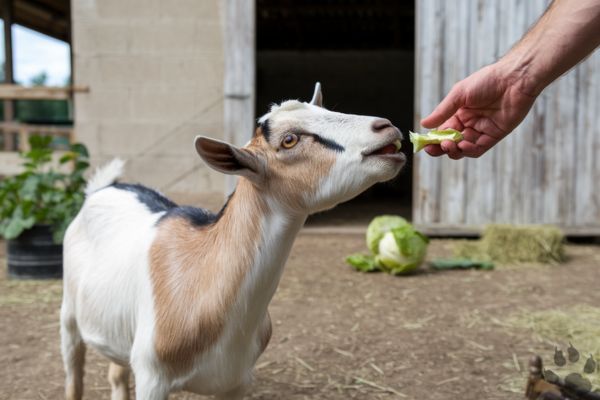
Nutritional Value of Cabbage for Goats:
The vitamins and minerals found in cabbage add nutritional value to goat diets. The fiber found in cabbage can help to control digestive and gastrointestinal problems in goats.
Cabbage contains vitamin C (which helps boost the immune system) to boost the immune system of goats and also contains vitamin K (important for healthy bones) to prevent blood clotting and bone health problems.
Vitamins like vitamin C and antioxidants in cabbage help protect goats’ bodies by fighting off harmful substances that could damage their cells.
Antioxidants work like bodyguards, protecting the goat’s cells from damage, just like a bodyguard keeps a celebrity safe.
While goats get many benefits from eating cabbage, goats also suffer from bloating or gas problems due to cabbage. Adding cabbage to a goat’s diet helps provide key nutrients for their health and a longer life.
Is it Possible for Cabbage to Substitute a Goat’s Daily Diet?
The nutritional value of goat food is further enhanced by the vitamins and minerals found in cabbage. Goats suffer from various digestive and gastrointestinal problems, which can be solved with the help of fiber found in cabbage.
The vitamin C present in cabbage boosts the immune system of goats, besides the vitamin K present in cabbage prevents blood clotting and bone health problems in goats.
Although cabbage has many benefits, if you feed your goat too much cabbage, it can affect its health because cabbage is not a staple in the goat’s diet. Cabbage can never replace the main food sources of goat food such as grass and hay.
It’s like how we can enjoy chips as a snack, but they shouldn’t replace our regular meals. By eating cabbage, goats get essential nutrients for their health and life.
How Often Should Goats Eat Cabbage?
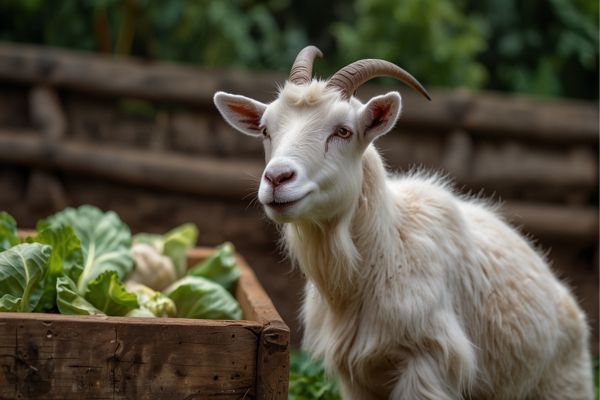
There is no doubt that when it comes to feeding cabbage to goats, it is important to feed goats in small quantities. Cabbage is not a staple food source for goats, but goats can still eat cabbage as part of a balanced diet.
However, cabbage should not be given as the main feed of the goat but should be fed as a treat.
It is best to feed goats cabbage occasionally. Eating too much cabbage can cause various digestive problems in goats, such as bloating and diarrhea, so if you want to keep your goats healthy, feed them a balanced diet of grass, leaves, etc.
How to Safely Feed Cabbage to Goats?
- Wash Thoroughly: Wash the cabbage to remove dirt and insects.
- Remove Outer Leaves: If there are any damaged or wilted leaves on the cabbage, discard them.
- Chop into Small Pieces: Divide the cabbage into manageable pieces so that the goat does not get stuck in its throat while eating.
- Limit Quantity: Feed goats small amounts of cabbage to avoid digestive problems, 1-2 pounds per adult goat per day is sufficient.
- Introduce Gradually: Use cabbage slowly to avoid stomach upset.
- Monitor for Allergies: Some breeds of goats can be allergic to cabbage, so watch for signs of diarrhea or bloating after feeding cabbage.
But it’s essential to know how much cabbage you can feed a goat to avoid any digestive issues.
The Importance of Moderation in Feeding Goats
A goat owner I know shared how she gave her goats too much cabbage by mistake, thinking it was healthy. A few hours later, her goats started having stomach problems.
This experience taught her the importance of moderation. To prevent digestive issues, she now serves cabbage to her goats only once a week.
Can Goats Eat Purple Cabbage?
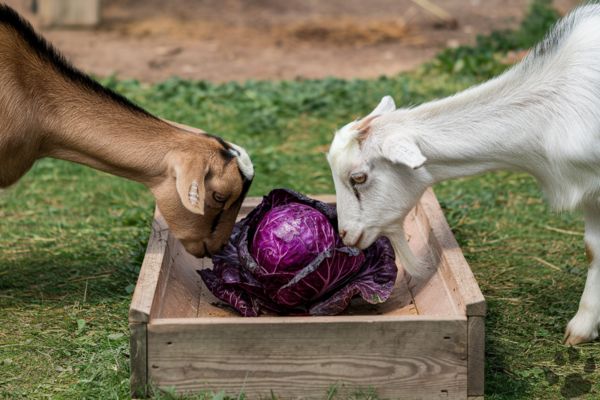
Like green cabbage, purple cabbage is also nutritious and can help keep goats healthy, but the condition is that purple cabbage should be offered to goats in moderation.
Purple cabbage also contains vitamins A, C, and K, as well as a large amount of fiber and potassium.
However, it should be kept in mind that purple cabbage should be added to the goat’s diet gradually so that it does not replace the goat’s regular diet such as grass or forage.
Purple cabbage leaves are fine for goats to eat in limited amounts but start slowly since they provide similar nutrition and might cause stomach upset if given too much.
Eating purple cabbage leaves is good for goats because they contain antioxidants and convey more variety to their food.
Do Cabbage Worms Cause Trouble to Goats?
When eating cabbage, if there are worms in it, it can disturb the goats. These worms are often called cabbage loopers or imported cabbage worms. They can adversely affect related plants, including cabbage.
When a goat eats cabbage that contains worms, it can suffer from digestive problems such as bloat and diarrhea.
Therefore, it should be ensured that plants accessible to goats, such as cabbage plants or other vegetation, are kept free from worms or larvae.
Different Fruits And Vegetables Goat likes:
| Different Fruits to Offer Your Goat | Which Other Vegetables Can Goats Consume? |
| Apples | Carrots |
| Bananas | Pumpkins |
| Berries (strawberries, blueberries, raspberries) | Squash |
| Watermelon | Sweet potatoes |
| Oranges | Peas |
| Pears | Green beans |
| Peaches | Spinach |
| Pineapple | Kale |
| Mangoes | Lettuce (in moderation) |
| Papaya | Beets (cooked) |
Always introduce new foods gradually to avoid digestive issues, and ensure a balanced diet for your goats.
Can Lactating Goats Eat Cabbage?
Cabbage is safe to eat in small amounts for lactating goats. It contains vitamins and minerals that increase milk production in the goat, thereby improving the growth of the baby goat.
So, if you give a large amount of cabbage to the goat, it will cause digestive issues. Therefore, introduce cabbage to the goat slowly and ensure a balanced diet.
Can goats eat cabbage leaves?
Cabbage leaves are safe for goats on one condition and that is if they are given in small amounts. Before feeding cabbage leaves to goats, make sure that they are free of dirt and also free of pesticides.
Goats enjoy different foods, so it’s best to give them only a small amount of cabbage leaves. If you feed cabbage leaves to goats, keep an eye on them and consult a doctor if any negative reactions occur.
Goats like eating cabbage leaves, but they can also enjoy fruits like grapes as a treat. Learn more about whether goats can eat grapes.
Can goats eat cabbage trees?
Although goats can eat cabbage leaves and stems in small quantities, it is not fair to say that these items are the main source of food for goats.
These trees contain toxic substances like cyanogenic and glycosides, which are not harmful if eaten in small quantities but can harm goats if consumed in large quantities.
Goats need a variety of foods, but vegetables and trees should only be fed occasionally.
Can goats eat raw cabbage?
There is no doubt that goats can eat raw cabbage, but moderation is important. They are also high in fiber (which helps keep the digestive system working well), which can upset a goat’s digestion if consumed in excess.
So, introduce vegetables, especially cabbage, to the goat slowly and think ahead as you observe its reaction.
Can goats eat cabbage seeds?
If a goat finds some cabbage seeds lying around while walking, it may chew on it, but if it eats a large amount of cabbage seeds, it can upset its digestion. So there is no risk in giving cabbage seeds to the goat along with a varied diet.
Conclusion:
Cabbage is a part of the goat diet so goats can enjoy eating cabbage. Cabbage is rich in nutrients that provide many health benefits to goats.
However, feeding a large amount of cabbage to the goat may make it difficult for the goat to digest. Although cabbage is a valuable feed for goats, it cannot be a substitute for daily goat feed.
Remember, if you want to improve your goats’ health, slowly offer cabbage along with grass and other necessary feed.
So, when pondering, “Can goats eat cabbage?” Remember, with care and moderation, they can enjoy this nutritious green delight safely.
FAQs (Frequently Asked Questions)
What should goats not eat?
Products containing milk sugar or caffeine are toxic to goats. Apart from this, various poisonous plants such as Avocado, chocolate, onion and garlic, potato leaves, and green tomatoes can also be poisonous to goats.
Are cabbage leaves good for sheep?
Cabbage eaten and thrown away can now be fed to lambs, which may affect animal performance.
What vegetables are bad for goats?
Any vegetables considered leafy greens, such as cabbage, kale, spinach, and turnip greens can be dangerous if eaten in large quantities. Eating tomato and rhubarb leaves can also affect goats’ health. These plants contain an oxalic acid compound that damages goats’ kidneys.
What foods do goats love the most?
Among vegetables, goats like green leafy vegetables such as cabbage and lettuce, and among fruits, apples, and berries are goats’ favorite foods. Goats also like to eat vegetables like carrots and sweet alfalfa, and alfalfa pellets are among goats’ favorite foods.
What are goats afraid of?
Goats can be scared by different things like loud noise or sudden movement of something, also seeing something unknown can scare goats. In addition, if the goat is separated from its herd, it may become fearful. Dogs or other predators may also cause fear in the goat.
Can goats eat tomatoes?
Although tomato leaves and stems can be poisonous to goats, tomatoes themselves are safe for goats.
Can goats eat apples?
Apples are sweet, tasty, and rich in vitamins and minerals, so goats love to eat them. Therefore, whenever you serve an apple to a goat, do not forget to remove the seeds, as they contain cyanide.
Can Baby Goats Eat Cabbage?
Cabbage should be cut into small pieces and served to the baby goat to avoid choking hazards. It is important to introduce the baby goat to cabbage slowly if we want to avoid digestive problems.
How much cabbage is safe for goats?
Goats should be given very small amounts of cabbage. For example, cabbage leaves can be given once or twice a week mixed with grass and forage. Avoid giving cabbage to goats that are pregnant or nursing their young, as the nitrates in cabbage can be harmful to them.
What are the signs of overfeeding cabbage?
Bloating, digestive upset, reduced appetite, lethargy, and kidney issues are some signs of overfeeding cabbage.
Can goats eat cabbage with pesticides?
Cabbage with pesticides is not safe for goats to eat. The pesticides on cabbage can harm goats, causing health problems such as digestive problems and organ damage.





